LOGOS and Montreal counter-culture
LOGOS and Montreal counter-culture
When one considers the earliest days of Montreal’s counter-culture and underground arts and activist scenes, it’s hard to exaggerate the importance and influence of LOGOS magazine. It was our city’s own contribution to the independent press that was emerging across North America, such as the Village Voice and the Georgia Straight. This entirely new publishing milieu gave a voice to the mid 1960s generation of youth that did not hear any of their political or aesthetic preoccupations reflected in the dull, conservative mainstream media landscape of the time.
ARCMTL, the non-profit archive of local independent culture behind this Montreal Underground Origins project, considers its set of Logos magazines as part of the very foundation of its collections of Montreal underground culture. Shortly after it was founded in 1998, Archive Montreal discovered stacks of old Logos magazines in the back rooms of Montreal’s oldest used bookstore, Russelll’s on St. Antoine St., just before it was demolished to make way for the expanded Palais des Congrès. Nestled among stacks of old Montreal newspapers from the 1800s and 1900s, such as the Witness, Star and World Wide, the psychedelic art adorning the Logos covers stood out as a complete break with all that came before it. Since then, it has emerged that just about every other alternative, underground or counter-culture publication that followed Logos in Montreal and Quebec was inspired and influenced by it.
We sat with founding editor Paul Kirby and his partner Adriana Kelder at Archive Montreal’s archive centre in the fall of 2015 to look at old issues with them, talk about how Logos came about and what their experience living in Montreal in that era was like. What follows is an edited version of the conversation, interpolating a transcript of Kirby’s presentation at the October 2015 conference, Contre-Culture: Existences et persistence’s at McGill University, as well as portions of a phone interview with Kirby conducted by our colleagues at Ghetto Mohawk in December 2014 for their special issue devoted to Logos, available to order on their website.
LR= Louis Rastelli
AK= Adriana Kelder
PK= Paul Kirby
AT = Alex Taylor
LR: How did you come to be in Montreal in 1966?
AK: I went to school in the Lakeshore, in Beaconsfield. I was born in Holland; my parents emigrated when I was 8 and came to Montreal in 1956. I was going to the Beaux-Arts when I met Paul through my oldest brother Robert Kelder, who wrote for Logos. I was fresh out of high school when I started at the Beaux-Arts, I think I was 19. It was like a four-year college course that I never finished before we left town.
LR: And how about you, Paul?
PK: I arrived in Montreal around ’66. I had gone from the University of British Columbia to North Africa and then back to Vancouver, before enrolling in graduate work in psychology at McGill. I got so disillusioned by the narrow focus of McGill psychology that I ended up becoming good friends with the head of the Philosophy department, having already gotten a degree in philosophy. Another friend was Chandra Prakash, a graduate student in English Literature (later on a longtime film teacher at Vanier College), was very involved as well against the Vietnam war, Palestinian rights and human rights activities in Montreal. We made some proposals to the Liberal government, even met a couple of ministers regarding Canada’s position on Vietnam. We discovered that they were saying one thing in public, but then backing away from any kind of commitment. In the process, we connected with Laurier Lapierre, a journalist at the CBC, hosting the program “This hour has seven days”. It was one of the best television news shows, a fellow Master’s student John Grey was a correspondent—he may have been involved in that radical McGill Student Handbook. The show was taken off the air because it was considered too radical. Anyway, the head of the philosophy department at McGill and myself who brought Noam Chomsky to McGill- he came and talked to the combined psychology and philosophy department.
The speech itself was such an incredibly beautiful academic shredding of 30 years of McGill’s deterministic behavioralism, and very pointedly, the experiments at the Allan [MEMORIAL] with the CIA. It was a beautiful thing to watch.
We had a number of meetings with Chomsky privately, telling him of our plans to gather a bunch of intellectuals and artists and writers, and go and work in the fields of North Vietnam. He immediately pointed out to me would be a Godsend to the U.S. forces, because they would just drop a few bombs and kill all the people that were opposed to the Vietnam war. He suggested we start a hostel for draft-dodgers and war-resisters in Montreal instead, which is what we did. It was called the Gandhi House, down on St-Antoine at Atwater, we set it up in conjunction with a man by the name of Nardo Castillo.
He was one of the key people in the Spanish anarchist world, involved in the Spanish Club and most likely the child of some Spanish civil war anarchist.
The draft dodgers were actually quite a small community and, you know, it was difficult at the time to find any English-speaking Montrealers that were against the war. Over the period of like six months there was probably around 100 people that came to Montreal as war resisters. A lot of them were artists, photographers, graphic designers, and writers who, for various reasons, were coming up to Canada to resist the war or to escape the clutches of the draft system. These became the nucleus of the people that eventually became the Logos community.
We all realized that we had this incredible pool of talent and at that time, we really wanted to start something that would ignite everything we had, and that was Logos.
Logos went through quite a few changes, but in the beginning we really believed in the principles of participatory democracy, and how things could change if people were just rational. We were young idealists. At the time Lester Pearson had realized that Quebec was a bubbling pot of potential uprising so he got a hold of three or four Quebec intellectuals, one of them being Trudeau, another was Marchand and Chretien and Lapierre…
AK: And René Levesque too.
PK: Yeah! Pearson was a very smart guy and he really wanted to co-opt the Quebecois movement. Marchand was the newly appointed, freshly-minted minister and he made a speech somewhere in Canada—a very anti-American speech—on how Canada had to pull out of any involvement with the US fight in Vietnam. So Chandra and I said: “Fantastic! Meet us for lunch and we’ll work with you on this! You’ve got two graduate students here and we’ll just go-to-town with you.”
We did meet him for lunch, and it was the most amazing 180 degree turn. He had gotten blasted after his speech by Pearson and a few others hardcore Liberals. They said “You can’t go near those ideas. We don’t want to turn on our brothers down south.” So Chandra and I were just aghast. It was another one of those pivots where our naivety did another turn and the wheel turned a bit more. It was one of the other reasons for getting the paper together, because we knew that in Canada, there was no source of political, anarchist fervour anywhere. The other papers were more oriented around drugs and music, we got involved in music and psychedelia and things like that but were always pushing the political agenda as much as we could. Hence, the chasing of us by the heavy hand of the man!
I was still living in Gandhi House when we started the paper. It was huge, two floors of a really old cockroach-infested house on St-Antoine.
AK: It was ghetto.
PK: The area was starting to be inhabited by artists and writers who were being pushed up the hill, pushed down below. I found out about the place from a sculptor who lived right opposite the street. It was big, and we could put up a lot of people, it had a huge kitchen. The draft dodgers and resisters didn’t stay very long, a lot of them moved into I guess what is Mile-End now. It was cheap as hell. We stayed there until we moved to Coloniale Street.
LR: Did someone keep it going after you moved out?
PK: I’d have to say, I don’t think so. Chandra wasn’t involved with Gandhi house very much, but it’s in the number one issue of Logos…
It was the beginning, at the times, of underground press. There was the Berkeley Barb, The Village Voice, The LA Free Press, and few others. We formed a committee of five people, among them Chandra, Adriana’s brother Robert, John Wagner and Alan Shapiro, and put out a first edition in the fall of 1967. John was our cover artist and made four or five covers through that early period; he eventually went to Arizona to concentrate on his art. Chandra also got less involved, since he had his PhD going. In the meanwhile, I had quit McGill, so the newspaper fell to Robert and myself.
Just after the first issue, we acquired a loft on 3666 Saint-Laurent, above a bakery. I think we put out three or four issues out of that loft, and then we rented a duplex on the corner of Coloniale and Prince Arthur, right beside a fish market. We had the office in the basement, and living quarters on the other floors. That was the first time we all moved together, so it became known as the Logos house.
AT: (flipping through the first issue of Logos) There’s a Le Chateau ad in there.
PK: It funny that you mention that ad. I spent two or three days, if not weeks, just walking around Montreal, going into places saying: “We’re starting an underground newspaper or a magazine dealing with the arts and politics, would you like to advertise in it?” And lo and behold, at Le Chateau, which was just the one store on Ste-Catherine Street, I saw this beautiful jacket in their window, and I ended up getting it in exchange for an ad.
There’s an ad for a magazine called Take One. I walked into their office, they had just started, and I walked in there not knowing what the hell it was about and pitched the guy. He had this very peculiar smile on his face and finally said: “D’you know what we do?” and I said: “Not really, but I’d love to have you advertise in our paper.” And he smiled and said: “OK, I’ll do it!”
And he wrote a cheque for fifty bucks or something. It was a film magazine.
None of us had any grand designs. We sold the paper, and we sold the ads, but we never had any belief that the paper would become a commercial, long-running success.
LR: Did you break even in the beginning or at least cover costs?
PK: Our printing costs were so minimal.
LR: Some of these businesses in the ads you probably knew about already, the New Penelope for example, and others you were saying from just walking around.
PK: I might have met the guy from the New Penelope [GARY EISENKRAFT] while putting that first issue together. We actually started a free university together through the paper and I don’t know what happened with that.
LR: Was Café Prag a place you would hang out at?
PK: Café Prag was where you [ADRIANA] and I used to go to dinner, with the vanilla pudding.
AK: (laughs) [LOOKING AT ISSUE] This is somebody we never knew what happened to him, Allan Shapiro. He was an American. He went to Paris and got involved in the student revolt…
PK: In ’68. He phoned us from the US embassy and he was in Prague and Berlin and then we lost track of him… it was either the second or third issue.
LR: How many people were in the Logos crew then?
PK: At that point, if you took the whole sort of family, there was probably like 20-25, and we always told people: “Take the paper and try to sell it and if you can return some money, fine,” but it was never our intent to make money. I don’t know how in the hell we fed ourselves.
AT: Did advertising cover the printing of the paper?
PK: It must have because there was a printer –the same printer throughout the whole run…
LR: Was it the same printer as this Midnight magazine, by chance? The format and paper type is pretty much identical.
AK: Some of the people that wrote for us also worked at Midnight.
PK: One was from England, and there was one other guy that published all those newspapers, there was about 8 of them, I think. He had one office, and each paper had one desk and one person, and that’s all they did was banged them out!
LR: The graphics that you would get, they were quite interesting and very nice. Did they have to draw them that size and bring you the originals?
PK: We always worked on 20% reduction. We would do all the original artwork, paste it all up—spent a stupid amount of time justifying all of those columns—and we had these IBM Selectric typewriters. We had one person who was like the design/ layout and he or she and myself did the layout, then we took all the pages to the printer and he just photographed them and burnt the plates and ran the paper.
LR: Did you do 10 000 copies or so?
PK: Later when we got to our last issue, it was 25 000, but it started out as 5000 or something.
But right away with the first issue of Logos, we were all arrested by the Montreal police. First of all, they accused the paper of not being very Catholic, and at first I thought that he was talking about the more universal use of the word, so I was a little upset that it wasn’t deemed Catholic. Then I realized he was talking about the actual religion, and I said: “Oh my God! No. It isn’t! As a matter of fact, it was very anti-Catholic,” and he said: “Uh huh, well, now we’re going to have to charge you!”
So it was an on-going battle between ourselves and the Montreal police, and they were certainly egged on and directed by Mayor Drapeau. They would claim that we had no license to sell the paper on the street, which we didn’t! And we would claim that you couldn’t get a license to sell a newspaper on the street, because it would be a restriction of freedom of the press. This is because if there was a license needed to sell a newspaper on the street, it meant you would have to go through a process, and at the end of the process, you could be denied the license, which would be, again, a restriction of the freedom of the press. We actually staged these photo-opportunities… just go down to city hall and try to buy a license to sell the paper, and we would end up, of course, not getting a license because there was no such thing. But in the end, we must have had over a 150 charges against various people, a lot of them being draft-dodgers and if they were found guilty of the so-called massive criminal offence, they would be sent back to the U.S., but it didn’t stop them from selling the paper on the street.
It wasn’t the people, cause there was a whole range of people selling it. At some point, even playwright David Fennario, mostly known for his later play Balconville, was dropping by to sell the paper.
AK: It was mostly young people, obviously. It was one way they could make some extra cash.
LR: It started out bilingual but didn’t stay so for long, why was that?
PK: It was an interesting time in Montreal and Canada. We were invited to the first Cultural Congress in Havana, Cuba. At the time, we had a number of Quebecois with us, and a person who was instrumental at this point in the development of the Quebec-side of Logos was Jacques Leroux-Langlois. He went to the Cultural Congress on behalf of Logos. I believe it was in the second issue that we printed a supplement on the Cultural Congress, and it was very inspirational, the whole congress was, but also the material that Jacques brought back.
Another little incident was that when the police raided our establishment–which they did many times!–we had a package of information that was given to us for this congress saying “with the compliments of the Cuban embassy in Montreal”. So we cut out that piece of cardboard and taped it to our bright red IBM Selectric typewriter, and the press reported a year later you know, that we had got a gift of a communist typewriter from Havana! (laughs)
Anyways, the next issue, we embraced Quebec Independence, completely, and we had articles from Gagnon & Vallieres, they were the FLQ folks in jail at the time, charged with terrorism and other charges, but were still in communication with their people in Montreal; we published some of their articles. And then it became apparent to us that–as a bilingual paper–we were upholding the same structure that Canada was. So we made a big issue, separating, declaring independence for a French-speaking newspaper called “Le Voyage” (advertised in Logos #5). A number of individuals who were part of the Logos family at the time moved out and published that while we maintained an English, separate entity.
Once we separated, we still had communication, but we did not line up our editorial policies or what we were going to be writing about. I think that a number of individuals stayed in touch, and they were very helpful with a lot of our trials as time progressed.
AT: Do you have an edition of Logos among those on the table here that you’re particularly proud of, or that has more meaning to you?
PK: Well, (pointing at issues of Logos) I got busted for that one, busted for that other one right there…
AT: What was offensive about that?
PK: There’s a picture of a woman in a bathtub in it… they didn’t need any reason, really!
LR: And then there’s this one …
AK: I was asked to pose for the cover in which my body was painted–it wasn’t photoshopped! That wasn’t doable in those days (laughs). I was physically painted and posed holding my hand in front of my face like so, pretending to kiss whatever was sitting in my palm, which was later superimposed as a policeman trying to pull out his gun. Immediately after it came out it was banned, banned obscene! This could not be distributed on the streets of Montreal even though Playboy was very popular and doing good business. But a woman making fun of a Montreal policeman was too much of a political statement, so it was outlawed. So this copy really went underground, not that many copies went out. I was still a student at Beaux Arts, and Paul was charged with publishing obscene material. One of the main reasons we left was because it got so that Paul was not able to do any more publishing in the province of Quebec, because that was a civil suit as opposed to the sedition charges (from the Drapeau issue), which were criminal and federal.
PK: Also, like I mentioned, from the very beginning, every one of these we were busted for selling a paper without a permit! I mean, the very first issue, myself & Chandra got arrested together, it just kept snowballing and we told people: “Keep moving! Don’t stop. Sell a paper and move on!”
LR: How fast did it take off?
PK: It took off pretty quick. The first issue, that attracted the likes of McLaren, the whole crowd around the NFB, and some of the people associated around Take One.
AT: Was the readership just that college, university audience or did you have 16-17 year-olds thinking that it was pretty cool?
AK: I think there were a lot of people from the suburbs that picked it up, and a lot of young kids came downtown and would sell the paper. There was a big street movement going on at that time.
PK: There’s one issue here, there was a guy who was sort of… he was a pharmacist, he ran his family pharmacy in Nova Scotia named Lloyd Stone. He was probably in his forties and of course, we were all very young, early 20s. Somehow he came to Montreal and he found out about the paper and said: “I’m gonna buy an ad in every issue and you can do whatever you want for it.” At one point he bought a back page.
LR: OK before we get to the most infamous Logos issue, you mentioned at the conference on counter-culture an anecdote about another sort of newspaper prank.
PK: The conference was the first time that I’d been to McGill since 1966. At that time there was a particularly interesting writer by the name of Paul Krassner, who published a periodical called The Realist. In our late summer of ’66, he published an article, which was what one would call extreme satire. You would have to be excessively paranoid to believe a word of it– without getting into too much detail, it was a story about Lyndon Johnson masturbating in Kennedy’s wounds on the plane back from Dallas to Washington. And so, the very brave and courageous editor of The McGill Daily decided to publish that article, and within three days, he was fired as the regents of McGill believed the article! (laughs) Which was a statement in itself!
So a bunch of us were very upset about the infringement of the freedom of the press, so we organized demonstrations and rallies. There weren’t too many of us, about 150 of us. At some point, we occupied the administration building and police arrived threatening to charge us with all kinds of things. So then, a number of people left until about 20 or 25 of us were hanging in there. And this way, when we decided to escalate the sit-in and went upstairs and occupied the president’s room. Not only that, we actually started rifling through the president’s files and discovered a lot of incriminating evidence of McGill University’s involvement in armament research, research related to the Vietnam War, and we had actual black and white evidence of this.
LR: This sounds like what may have ended up in that student handbook we talked about earlier. The McGill Daily incident certainly prefigures what happened with the infamous Logos issue.
PK: Our concept of what we were doing in terms of a newspaper was that were creating a piece of guerrilla theatre. Now guerrilla theatre at the time was part and parcel of the sort of anti-war movement, but it also evolved into freedom of assembly and basically–in the United States–freedom of thought! So, the newspaper evolved with that.
One afternoon we gathered at a coffeehouse on Park Avenue, four or five of us, somebody had just come from Boston and had seen a newspaper headline of The Boston Globe that said: “Yanks shot by dope-crazed Cong!” That was actually the headline, and I was so flabbergasted by that, the unbelievable amount of exaggeration and inflammatory statements. Of course, it always was the case that major newspapers in those days spent a tremendous amount of time thinking up headlines like that, and using them to flog their newspaper. So, that was the birth of the idea of a fake issue of The Gazette, and we decided to have our headline be: “Mayor shot by doped-crazed hippie!” So, it was basically a piece of pirate theatre, pirate journalism.
Adrianna and I spent hours in the library at the Gazette itself, and this whole front page was based on the one from when Kennedy was shot. We inserted our own stories but the tone and the structure of the front page was identical to that front-page.
AK: I think we turned the “G” around in The Gazette so that we wouldn’t get caught! (laughs) And the fonts…
PK: Everything was exactly right… but this one article … (pointing to a specific article)
AK: … Was a reject from Midnight.
PK: It was too preposterous! When you go into these things, there is a certain amount of naiveté, and you dream of having such an impact when you’re doing something like this, but you never believe that it’s going to have that impact. We got quite organized over this, and once the newspaper was printed and folded in half, if you looked at it from 3 or 4 feet away, it did look like an issue of The Gazette.
We designed it all, wrote it all, which we did with every paper, but we stayed pretty tight-lipped about this one, because we anticipated there could be a pretty extreme reaction. And we had already been in jail so many times and charged with so many so-called offenses, that we knew we were going to get slammed. We created a strategy to make as much noise as we could. We realized that the best way to do this was to bundle these papers and create a piece of street theatre with them.
Peter Katadotis– who eventually went on to run the NFB in Canada– volunteered to drive us around. The fun part of this whole thing is that he was not part of the sort of Logos inner core at the time, but he heard about it and he got so excited about it! Her & I got into a car with Peter and stacks of our paper– and they were all labelled for metro stations and also for CBC and various radio stations and, theatrically, we would grab the bundle for say Berri and start running into the metro station, screaming at the top of our lungs: “Mayor shot! Mayor shot! Mayor shot!” dump the papers on the newsstand and run away.
At the trial, which was a year later, I was over-impressed with the reaction. What happened was that we dropped some at the old CBC building on Dorchester (now René-Levesque), and we didn’t know this at the time, but they interrupted broadcasting nationally, brought in some experts and started talking about this horrific event, that the mayor had been shot by a doped-crazed hippie. Now, it would have been super easy… if you open that page, you would have known immediately that it was Logos, because the rest of the newspaper was a visual, artistic display of pretty insane graphics. So, there was no doubt that it was a Logos paper and that it was a Logos spoof, but again, I can refer you to The War of The Worlds that Orson Welles did back in the ’30s. There’s no doubt that there’s a huge amount of naiveté and panic to push the button in these situations… I mean, fast-forward: we have Bill C-51, which is a panic-button push.
One of our points, beyond the local Montreal issue of selling a paper without a license, was that newspapers are basically headline-driven. The content is held hostage to the headline, and it’s often false, or certainly exaggerated. That’s why we put out that explosive headline.
Of course, then what happened was during all the distribution and aftermath of it all, they were so embarrassed. Their egos: the police, the mayor, they were all just completely discombobulated and completely distraught over the fact that we pulled this off. So they immediately issued an all-points bulletin, where they sent squad cars everywhere, all over the city, and police officers armed with guns to grab any Logos person at all and to raid the Logos House.
You know, in your dreams you think, “Oh, this is going to have a huge, significant impact. It’s going to change things”. But we didn’t anticipate, in our wildest imagination, that they would really go across the country with the news. I got a phone call from the Gazette reporter Phil Winslow. They had just broken up from the meeting that the publishers had called about this, and he had gone by a desk and they had police scanners. He said, “Get out of there! They’re coming! They’re coming to the Logos House!” So we all packed some stuff and ran out. Adriana and I went to a friend’s apartment about a block away, and the rest of the people just disappeared into other people’s homes. Then the police arrived, and according to the neighbours, they came up in a lot of cars with all their lights blazing and guns drawn, and just started smashing doors down. There was a reporter from some radio station who had pulled up just before they had arrived and they almost shot him. It was that close. He had to duck down and scream that he was a journalist.
And it went on. Every hour, we were at the top of the news. “Paul Kirby and his lover, Adriana Kelder, are in hiding.” Actually for the first five or six hours, there were of course, rumours that we had crossed the border. A lot of this we didn’t find out about until the trial, which was a year later. We didn’t realize the extent of what we had actually created until they brought all these people in to testify at the trial. It was quite illuminating to hear all these stories and realize how much we had pushed their buttons.
AK: He came to the trial, Drapeau.
PK: Yeah. He had to prove that he wasn’t dead! (laughs)
Before we were sentenced, there was a number of other trials going on, as I mentioned. We were already charged with two counts of publishing obscene material and about 35 counts of selling a newspaper without a license on the street. Even though the lawyers were doing everything pro bono, for free, we still had to raise money because there were court costs.
So one of our people from England, his name was Julian Harding, he informed us that he knew somebody who knew somebody who could get to John Lennon. They had just made the film Magical Mystery Tour and it had only shown on UK television. So us together with three or four other people made a presentation to his friend to get to John and ask him for the Magical Mystery Tour film so we could show it in Montreal and use it as a fundraiser for all these trials. Lo and behold, one cold winter morning, there was a knock on the door at the Logos house. This guy hands us a big package, a film. So we took it inside and opened it up and there was a note inside saying, “Paul, and Nans, and Logos, good luck. Stay out of jail. Your friend, John.”
It was great, but you know in those days, there were so many people that we were connecting with. The world hadn’t evolved into this disingenuous worship of celebrities. So we just took the note and said, “Oh, that’s really nice,” and then we threw it in the fire. And then we proceeded to make plans to show the film at Sir George Williams, McGill, and at University of Montreal. It took us about two months to organize all the showings, I think we did four or five nights at each university, and we made enough money to keep the lawyers happy and put out a last issue of Logos.
LR:
Did you mail them, get a lot of subscribers through the Underground Press Syndicate?
PK: We had a distributor in the United States and he would come up and pick up 10 000 copies, I don’t remember, but that was only at the end. Prior to that we used to mail copies to bookstores in New York, San Francisco, Los Angeles, Chicago, Detroit and on and on.
LR: Did you ever do a trade or receive from The Village Voice or…
PK: We did. We started a distribution service called Polis Germinations and we ended up distributing almost all the underground papers, the Berkeley Barb, and we became the distributor of Rolling Stone.
AK: As soon as we started making money, we left!
PK: Rolling Stone was just a small magazine at the time. It was right around the time when my trial was over, which was in July. I was convicted for sedition, and also I had put up a peace bond with the city, so we couldn’t do anything, so that’s why we left. We turned Polis Germinations over to one of our people, Charlie Castillo. At the time he had a whole family connection in Lachute. He and his partner were selling thousands of copies of Rolling Stone, and of course the other stuff was selling too, but nowhere near as much… The War Measures act was enacted and the next night, or two nights later, at 3 in the morning they woke with cops standing around their bed! And they had to walk in through about four feet of snow ‘cause he lived in a little old farmhouse and didn’t bother shovelling it. The cops were so pissed, they just grabbed him and took him down to the Montreal police station. Then they found out that he was a draft-dodger, even though he had Canadian residency, they took him right to the border and he spent a year in jail.
Apparently there have only ever been two people charged with sedition in Canada. So I’m one of the two. Fortunately I had a really good lawyer by the name of Morris Fish, who became a Supreme Court judge in Quebec in 2003.
Time Magazine wrote an article about it—a number of magazines did—it became an issue of freedom of the press, and that was our whole raison d’être. We were advocating freedom of the press, fully! And under no circumstances could we be banned because it would be a restriction of freedom of the press, so that was sort of our cause all along. Montreal still had quite a strong leftist, socialist, old commie scene. It started in the ‘30s and Dorothy Livesay, she was quite a good Canadian writer…
AK: …and Irene Kohn…
PK: She became a very close friend, they were all connected around the National Film Board, and specifically around people like Norman McLaren, who was a very political guy. They were all very supportive of Logos and became patrons of the paper. It was a pretty strong scene of people who were young and vibrant and active in the ‘30s, so by the 1960s they were in their sixties. Then there was also a bunch of people that came with that whole Soviet development, and Irene’s father was the first ambassador from the Soviet Union in Canada, and then it evolved into camaraderie with the civil war in Spain, and as a result of that…
AK: Norman Bethune.
PK: Yeah, he was sort of key to that whole thing. He lived in Montreal and he had many lovers but Irene Kon, who was our friend and supported the paper, was one of his lovers. There were also a lot of Spanish anarchists around the Spanish club.
Anyway Morris had been drawn to our case in all of this support we had, but in the end basically told us that it was pretty well a lost cause, but he wanted to take it to the Superior Court and so he did. I was eventually found guilty and I was given a 2-year probation sentence, or suspended sentence, and I had to put up that peace bond.
AK: $1000?
PK: It was so ridiculous—a peace bond!
LR: Were there any rallies or public events?
AK: Well, that’s when we did our first Lord Maudsley Circus…
PK: Yeah!
AK: Performing arts…
PK: That’s a whole other story.
AT: Did you know those Lord Maudsley people personally?
PK: Yeah—That’s us! And that’s what started the caravan. That was the transition.
AK: Wasn’t Lord Maudsley a dog?
PK: Lord Maudsley was a dog that we had in Vancouver. Myself and a couple of other people lived in a really great place in BC, outside of Vancouver called Deep Cove. It’s where Malcolm Lowery wrote 5 or 6 novels. He was one of those ‘50s novelists who drank himself to death like many others.
LR: Where would you have held an event in Montreal?
AK: The Moose Hall, on Park near Pine, is that still around?
LR: When you actually had to leave, was it a midnight move?
AK: No. We had to fix up our Volkswagen bus/van. I was pregnant and wanted to go before I gave birth.
POSTSCRIPT
Paul and Adriana had already begun planning a new caravan – travelling performers type project by the time they left Montreal. Adriana had grown up in the West Island in the 1950s when it was possible to regularly go horseback riding at one of the stables that still dotted Cote Vertu West and St. John’s Boulevard. A film about their early days with the Caravan was produced by the NFB (Horse Drawn Magic, 1979) and you can keep track of their current Caravan activities on their website here and their Vimeo channel.
Logos Magazine continued after their departure with various editorial teams, publishing until 1972 while retaining its radical political and counter-cultural positions.
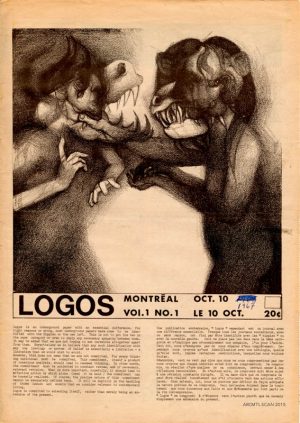
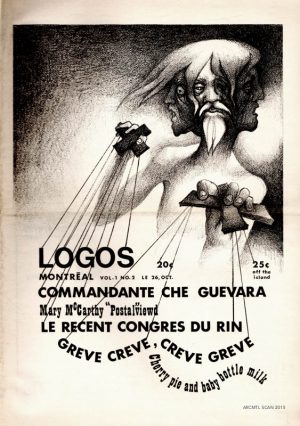
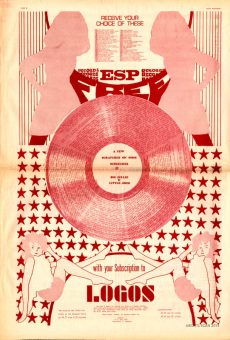
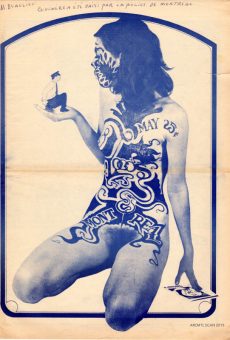
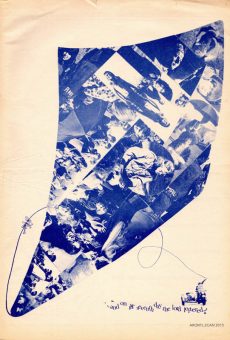
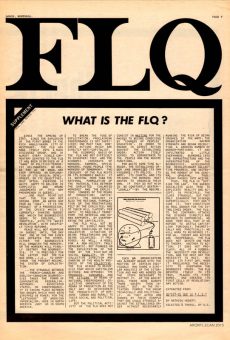
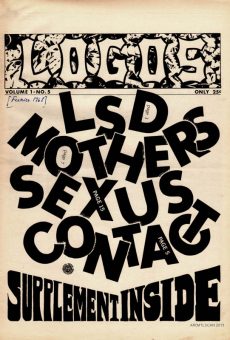
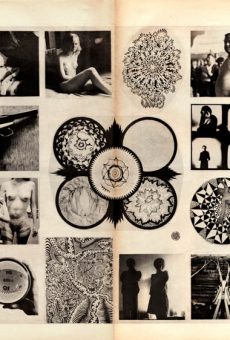
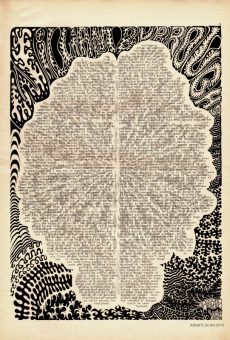
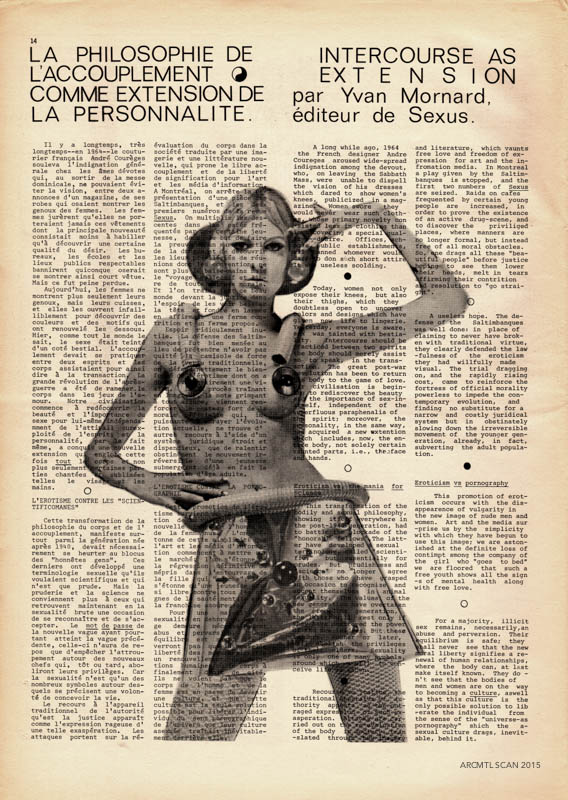
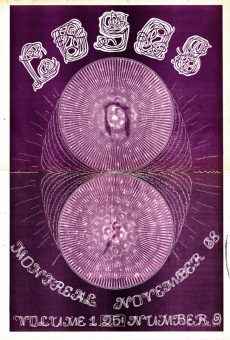
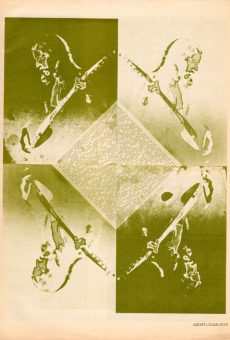
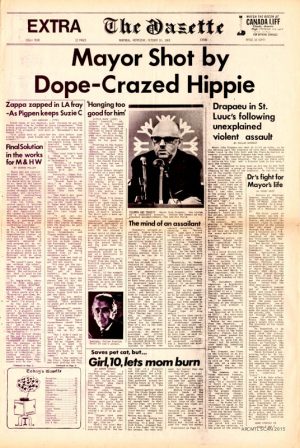
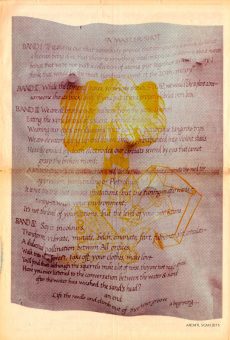
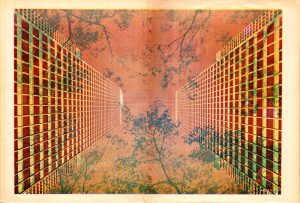
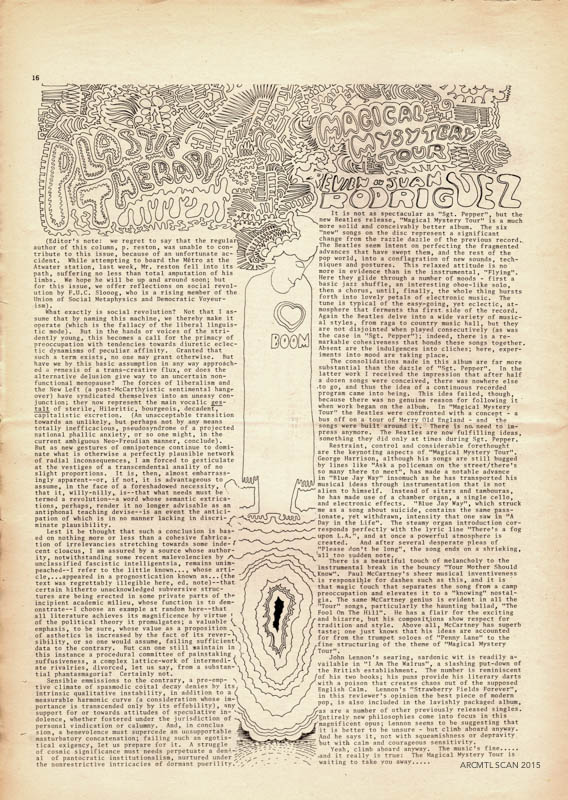
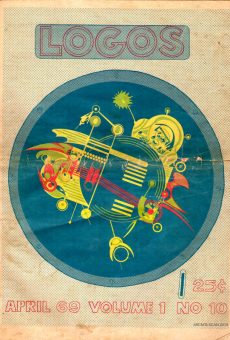
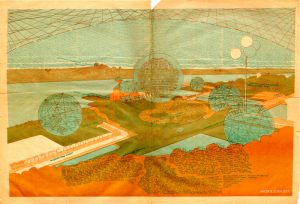
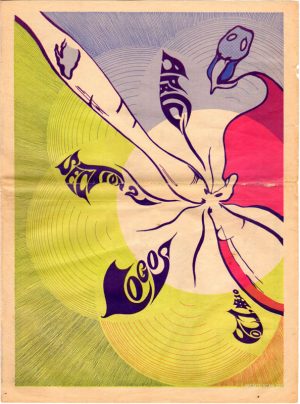
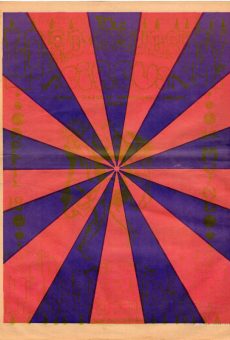


Thanks for this interview!
I´m from Finland and used to be part of the Finnish underground movement late 60s. Believe it or not I happen to have Logos vol 1, no 10 and vol 2, nos 1-4. I don´t need them anymore. Are you still interested to have Logos issues?
Great web site!